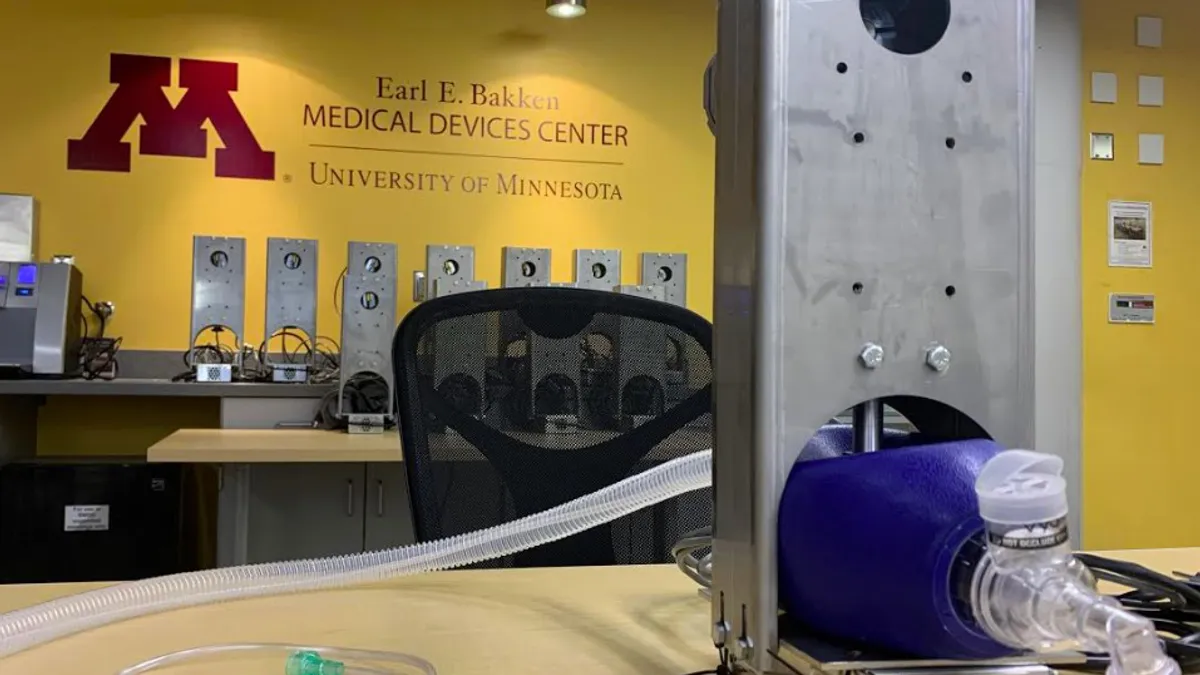Dive Brief:
-
Boston Scientific will begin manufacturing an approximately $1,000 emergency resuscitator, authorized by FDA for use when no other means of mechanical ventilation are available.
-
Working with the University of Minnesota (UMN), with Medtronic also providing input, Boston Scientific helped create a device that sells for roughly 7% of the price of ventilators Philips is charging the U.S. government.
-
The technology, branded Coventor, was developed and greenlighted in line with an emergency use COVID-19 policy from FDA on adapting devices as ventilators. A Boston Scientific spokesperson told MedTech Dive the company will initially produce 3,000 of the devices "and will look to scale up from there based on demand."
Dive Insight:
Fully featured hospital ventilators are complex devices featuring hundreds of components. While those may support desirable features under normal circumstances, they are a potential disadvantage in a pandemic when global supply chains are disrupted and the focus is on equipping hospitals to provide respiratory support to as many people as quickly as possible.
The device is designed around the pressures created by the pandemic. Mechanical ventilators typically require pressurized oxygen or air supply. Coventor, in contrast, is a cereal box-sized device that consists of little more than a mechanical arm that compresses an ambulatory ventilation bag to push air into the patient, according to UMN. The device uses ambient air if external compressed oxygen is unavailable.
The design decisions have enabled Boston Scientific and its academic partner to create a device that can be produced for significantly less than fully featured ventilators. The government is paying Philips and General Motors an estimated $15,000 and $16,000, respectively, per ventilator under recently signed supply contracts. Medtronic plans to sell its emergency use ventilator for less than $10,000.
All of the devices, whether they cost $1,000 or $16,000, serve the same basic purpose of keeping people with severe respiratory problems alive. However, in stripping its device back to the absolute essentials, the University of Minnesota and Boston Scientific have created a device that differs from fully featured ventilators in many other regards.
In its statement about the authorization, the University of Minnesota called the device a ventilator. However, FDA, which called Philips’ recently authorized, stripped-down E30 device a ventilator, used slightly different language in regards to Coventor, describing it as an “emergency resuscitator.”
“This device is intended for compression of an adult manual resuscitator device intended for pulmonary resuscitation of adult patients for whom no other appropriate means of mechanical ventilation exists due to resource limitations from pandemic conditions in the region of use,” the intended use section of the emergency authorization states.
The simple design, reliance on off-the-shelf parts and low cost of Coventor could make it particularly useful in settings where access to fully featured ventilators is even more restricted than it is in the U.S. To help get Coventor to those locations, the University of Minnesota is making the specifications for the device available on an open-source basis. Manufacturers based around the world will be able to use the specifications to make versions of Coventor.
Boston Scientific worked with the university to win the emergency use authorization and is signed up to manufacture the device. Unlike Medtronic, Philips and other medtech companies now scrambling to make more ventilators, Boston Scientific is not an established presence in the respiratory support market.











